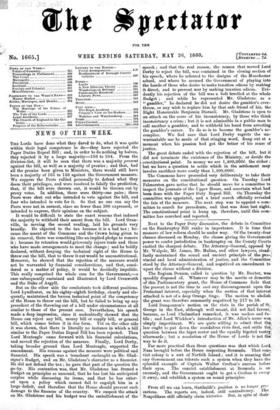NEWS OF THE WEEK.
TUB Lords have done what they dared to do, what it was quite within their legal competence to do—they have rejected the Paper Duties Repeal Bill ; and, in order to do nothing by halves, they rejected it by a large majority-193 to 104. From the division-list, it will be seen that there was a majority present against the bill, as well as a majority of proxies ; and that, had all the proxies" been given to Ministers, there would still have been a majority of 161 to 136 against the Government measure. We suppose the Peers rallied personally to defend what they deem their privileges, and were resolved to falsify the prediction, that, if the bill were thrown out, it would be thrown out by proxy votes. In addition, there were thirty-one pairs ; three Peers were shut out who intended to vote against the bill, and four who intended to vote for it. So that no one can say the Peers were net in earnest, since no fewer than 366 expressed, or intended to express, their opinions on the subject.
It would be difficult to state the exact reasons that induced the majority to withhold their assent from the bill. Lord Gran- ville in moving the second reading, laid his grounds very broadly. He objected to the tax because it is a bad tax ; be- cause the assent of the Commons and the Crown being given to its removal, there was something like an implied pledge to remove it ; because its retention would grievously injure trade and those who have made arrangements to meet the change ; and he boldly declared, without denying the technical right of the House to throw out the bill, that to throw it out would be unconstitutional. Moreover, he showed that the rejection of the measure would not be warranted by financial considerations, and that, consi- dered as a matter of policy, it would be decidedly impolitic. This really comprised the whole case for the Government,—a ease subsequently sustained and illustrated by Lord Cranworth and the Duke of Argyll.
But on the other aide the combatants took different positions. Lord Lyndhurst, on. his eighty-eighth birthday, clearly and elo- quently maintained the barren technical point of the competency of the House to throw out the bill, but he failed to bring up any precedent of the throwing out of a bill under circumstances at all similar to those of the present case. Nevertheless, his speech made a deep impression, since it undoubtedly showed that the House can reject any bill, money bill or supply bill, or general bill, which comes before it in due form. Yet on the other side it was shown, that there is literally no instance in which a bill similar to the Paper Duties Repeal Bill has been rejected. Then Lord Monteagle came forward with his financial calculations, and moved the rejection of the measure. Finally, Lord Derby, taking broader ground than Lord Monteagle, supported the amendment. His reasons against the measure were political and financial. His speech was a trenchant onslaught on Mr. Glad- stpne's Budget, and on Mr. Gladstone's character as a financier. He did not defend the tax ; he gave that part of the question the go-by. His contention was, that Mr. Gladstone has framed a Budget on principles so unsound, that he has lost his anticipated surplus while discussing its items, and that he has enter- ed upon a policy which cannot fail to engulph him in a large deficit, and therefore that the House should prevent such damage to the finances of the country. We suspect the attack on Mr. Gladstone and his budget was the embellishment of the
speech ; and that the real reason, the reason that moved Lord Derby to reject the bill, was contained in the closing section of his speech, where he referred to the designs of the Manchester school, and where he accused the Government of playing into the hands of those who desire to make taxation odious by making it direct, and to prevent war by making taxation odious. Evi- dently his rejection of the bill was a bolt levelled at the whole Budget ; and while he represented Mr. Gladstone as a " gambler," he declared he did not desire the gambler's over- throw, or any wish to replace him by that safe friend of his, the Right Honourable Benjamin Disraeli. Mr. Gladstone is open to an attack on the score of his inconsistency, by those who think inconsistency a crime ; but it is not admissible in a public man to call another a gambler, and to withhold his hand from arresting the gambler's career. To do so is to become the gambler's ac- complice. We feel sure that Lord Derby regrets the un- warrantable use he made of that stinging word, flung out at a moment when his passion had got the better of his sense of justice. The great debate ended with the rejection of the bill, but it did not terminate the existence of the Ministry, or decide the ..constitutional point. In money we are 1,400,0001. the richer ; but we have a question to settle which in the settlement may involve sacrifices more costly than 1,400,000/.
The Commons have proceeded very deliberately to take their measures on the constitutional question. On Tuesday Lord Pa1merston gave notice that he should move for a committee to inspect the journals of the Upper House, and ascertain what hid been done with the Paper Duty Repeal Bill. On Thursday the • committee was appointed, and a brief search officially revealed the fate of the measure. The next step was to appoint a com- mittee to search for precedents, and that was dona last night. The constitutional point is hung up, therefore, until this com- mittee has searched and reported.


























